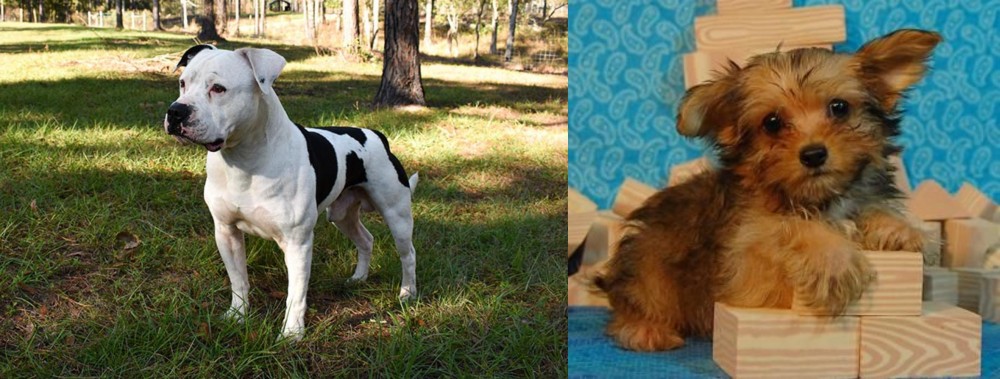 Both American Bulldog and Yorkillon are originated from United States. American Bulldog may grow 47 cm / 19 inches higher than Yorkillon. American Bulldog may weigh 50 kg / 111 pounds more than Yorkillon. Both American Bulldog and Yorkillon has almost same life span. American Bulldog may have more litter size than Yorkillon. American Bulldog requires Low Maintenance. But Yorkillon requires Moderate Maintenance
Both American Bulldog and Yorkillon are originated from United States. American Bulldog may grow 47 cm / 19 inches higher than Yorkillon. American Bulldog may weigh 50 kg / 111 pounds more than Yorkillon. Both American Bulldog and Yorkillon has almost same life span. American Bulldog may have more litter size than Yorkillon. American Bulldog requires Low Maintenance. But Yorkillon requires Moderate Maintenance
Basic Information
undefined
United States
United States
Weight Male:
32 - 54 kg
70 - 120 pounds
Weight Female:
27 - 45 kg
59 - 100 pounds
Life Span:
14 - 16 Years
12 - 14 Years
Other Names:
shades of brindle including red brindle, varying degrees of white, red, brown, tan, fawn and piebald.
Papa-ShirePapa-Shire • Papiyork • Yorkie Pap Papillon-Yorkshire Terrier Mix, Papillon-Yorkie Mix,
Colors Available:
Brindle, mostly white, white with brown or red and piebald.
White, brown and white, light brown/golden, dark brown/chocolate, black and brown, black
Coat:
Short and smooth
Straight, medium, fine fine, soft coat
Temperament:
Affectionate, Courageous, Friendly, Gentle, Intelligent, Loving, Loyal, Protective
Alert, Energetic, Friendly, Loving, Loyal, Playful
Grooming:
Low Maintenance
Moderate Maintenance
New Owners Friendly:
Yes
Yes
History
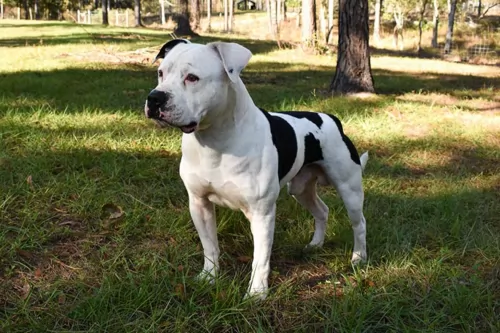 Following World War II, the American Bulldog was almost extinct.
Following World War II, the American Bulldog was almost extinct.
Thanks to John D. Johnson from Summerville, Georgia the breed is still with us today. He gathered the best dogs he could find throughout the rural South and bred them back into popularity among his family and other rural families. His father bred the American Bulldog before John did and they have bred them longer than any other in any part of the world. His dogs were regularly used for tracking, hunting, guarding, watchdog and weight pulling.
At some point Alan Scott joined Johnson breeding other bulldogs to Johnson's and forming the Standard American Bulldog.
The American Bulldog/ is popular today as a family pet and companion as well as a working dog.
The Yorkillon is a bighearted cross between the Yorkshire Terrier and the Papillon. They are small dogs with huge attitudes and big ears. They are known to be sassy and get into trouble. They are playful, affectionate and intelligent. They were initially developed in the US sometime about 20-30 years ago.
Not recognized by the American Kennel Club as they are considered designer dogs or mixed breeds
Description
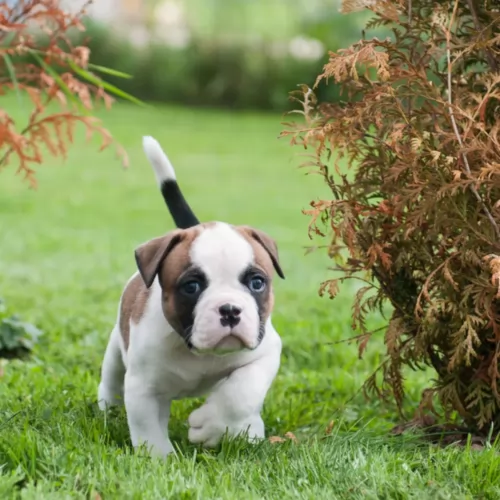 The American Bulldog is a powerful and muscular dog in a sturdy and compact frame. The female is more refined than the heavy boned and stocky male, but both genders are athletic, agile and quick. The have large heads, strong jaws, a muscular neck and with a moderately deep and wide chest.
The American Bulldog is a powerful and muscular dog in a sturdy and compact frame. The female is more refined than the heavy boned and stocky male, but both genders are athletic, agile and quick. The have large heads, strong jaws, a muscular neck and with a moderately deep and wide chest.
They have a square head, with muscular cheeks and a clearly defined furrow between his eyes. With broad, square and strong muzzles, they have a reverse scissors, scissors, moderate underbite and an even bite. Ears come in a variety of shapes and sizes and eyes can be any color as well. The nose however should be black and lips black as well.
Their legs are strong, heavy boned and straight with well-defined muscles in the hindquarters. Finally ,they have a thick, low set tail that comes to a point at the end.
The Yorkillon is a small dog that can look like a Yorkie or a Papillon but most due have large ears like the Papillon. Both parent breeds have long hair and short legs. There is still a lot of first generation breeding, but most are now products of multigenerational breeding. This means that every puppy can look different and no two are likely to look the same.
Characteristics
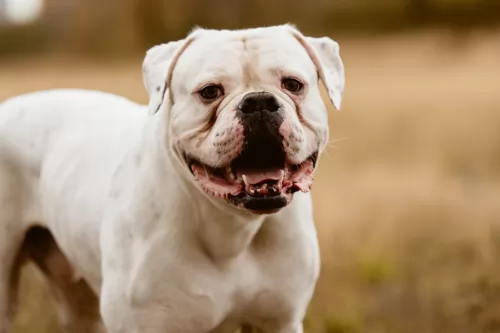 The American Bulldog is characteristically loyal, brave and reliable. It is a friendly, gentle dog that truly loves children. There is not a hostile bone in his body despite his history and reputation for bull baiting. Though he is protective of its family and affectionate with most, he still needs a human companion who is strong willed and a genuine pack leader. Without this he might become aggressive around other dogs and pets. They are immensely self-confident and they do slobber and drool and will become excited and hard to handle without daily exercise of both their body and their minds.
The American Bulldog is characteristically loyal, brave and reliable. It is a friendly, gentle dog that truly loves children. There is not a hostile bone in his body despite his history and reputation for bull baiting. Though he is protective of its family and affectionate with most, he still needs a human companion who is strong willed and a genuine pack leader. Without this he might become aggressive around other dogs and pets. They are immensely self-confident and they do slobber and drool and will become excited and hard to handle without daily exercise of both their body and their minds.
1.Children friendliness yes but be careful the children do not hurt the small dogs. This is particularly true regarding the risk of tracheal collapse.
2.Special talents – loves to do tricks
3.Adaptability – can live anywhere in an apartment as well as a home, but he would prefer to have a fenced yard to run in.
4.Learning ability – extremely smart and very obedient
Health Problems
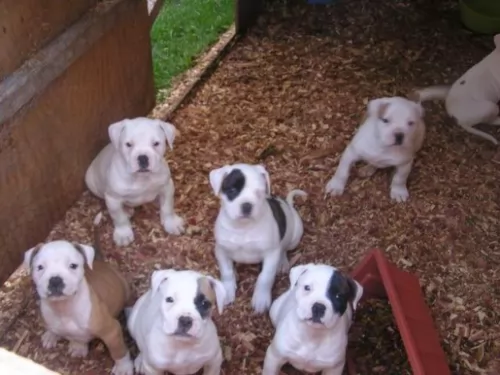 Though generally healthy, the American Bulldog is prone to a few problems.
Though generally healthy, the American Bulldog is prone to a few problems.
Hip Dysplasia
This is a serious issue in many breeds of dogs and is especially prevalent with the American Bull Dog. This may seem ironic in such a short legged dog but it is unfortunately very common. It is a genetic disorder that causes the bones in the joint to separate and causes the dog much pain and lameness.
Skin and Ear Issues
Due to skin folds you need to be care and watch for irritation and infection in the folds. They are also prone to ear infections.
Obesity
The American Bulldog is prone to overeating and all the health issues that presents. With short legs and a genetic predisposition to arthritis and hip dysplasia, obesity is a real health risk for your bulldog.
There are not a lot of hereditary health issues but there are some issues they can be prone to:
• Patellar Luxation – slipped knee caps can lead to lameness.
• Epilepsy – can be treated with medication.
• Diabetes – can be treated with medication
• Legg Calve Perthes Disease – blood disorder affecting hind leg bones.
• Heart defects
• Tracheal collapse
• Hip dysplasia – can cause lameness.
Caring The Pet
Feeding Puppies
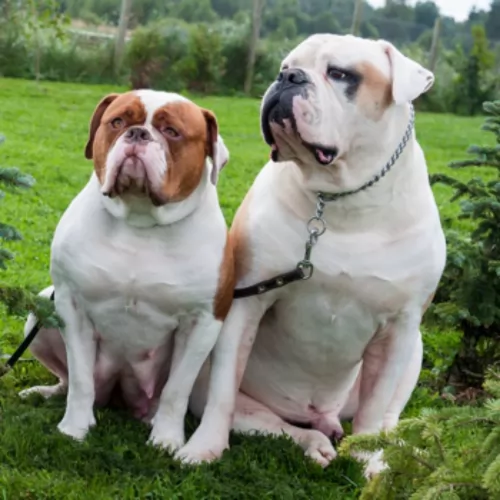 Three times a day from 12 weeks to a year for a total of 3 cups per day.
Three times a day from 12 weeks to a year for a total of 3 cups per day.
Feeding Adults
After 6 months cut back to one cup twice a day of high quality dry dog food.
Bulldogs will eat anything at anytime and are prone to obesity. Don't overfeed them.
1.Feeding the puppy Feed a high quality toy puppy food 3-4 meals per day a total of ¼ cup for the day.
2.Feeding the adult Feed a high quality toy puppy food 1-2 meals per day a total of ½ cup for the day.
3.Points for Good Health – No inherited issues.
4. Games and Exercises – These are high energy dogs as both parent breeds are such. They need to run, love having a fenced yard, 15-20 minute walks per day.
Comparison with other breeds
- American Bulldog vs English Bulldog - Breed Comparison
- American Bulldog vs German Shepherd - Breed Comparison
- American Bulldog vs Golden Retriever - Breed Comparison
- American Bulldog vs Labrador Retriever - Breed Comparison
- American Bulldog vs West Highland White Terrier - Breed Comparison
- American Bulldog vs French Bulldog - Breed Comparison
- American Bulldog vs Beagle - Breed Comparison
- American Bulldog vs Yorkshire Terrier - Breed Comparison
- American Bulldog vs Poodle - Breed Comparison
- American Bulldog vs Rottweiler - Breed Comparison
- American Bulldog vs Boxer - Breed Comparison
- American Bulldog vs English Pointer - Breed Comparison
- American Bulldog vs Siberian Husky - Breed Comparison
- American Bulldog vs Doberman Pinscher - Breed Comparison
- American Bulldog vs American Bully - Breed Comparison
- American Bulldog vs Abruzzenhund - Breed Comparison
- American Bulldog vs Affenpinscher - Breed Comparison
- American Bulldog vs Afghan Hound - Breed Comparison
- American Bulldog vs Aidi - Breed Comparison
- American Bulldog vs Airedale Terrier - Breed Comparison
- American Bulldog vs Akbash Dog - Breed Comparison
- American Bulldog vs Akita - Breed Comparison
- American Bulldog vs Africanis - Breed Comparison
- American Bulldog vs Askal - Breed Comparison
- American Bulldog vs Atlas Terrier - Breed Comparison
- Yorkillon vs English Bulldog - Breed Comparison
- Yorkillon vs German Shepherd - Breed Comparison
- Yorkillon vs Golden Retriever - Breed Comparison
- Yorkillon vs Labrador Retriever - Breed Comparison
- Yorkillon vs West Highland White Terrier - Breed Comparison
- Yorkillon vs French Bulldog - Breed Comparison
- Yorkillon vs Beagle - Breed Comparison
- Yorkillon vs Yorkshire Terrier - Breed Comparison
- Yorkillon vs Poodle - Breed Comparison
- Yorkillon vs Rottweiler - Breed Comparison
- Yorkillon vs Boxer - Breed Comparison
- Yorkillon vs English Pointer - Breed Comparison
- Yorkillon vs Siberian Husky - Breed Comparison
- Yorkillon vs Doberman Pinscher - Breed Comparison
- Yorkillon vs American Bully - Breed Comparison
- Yorkillon vs Abruzzenhund - Breed Comparison
- Yorkillon vs Affenpinscher - Breed Comparison
- Yorkillon vs Afghan Hound - Breed Comparison
- Yorkillon vs Aidi - Breed Comparison
- Yorkillon vs Airedale Terrier - Breed Comparison
- Yorkillon vs Akbash Dog - Breed Comparison
- Yorkillon vs Akita - Breed Comparison
- Yorkillon vs Africanis - Breed Comparison
- Yorkillon vs Askal - Breed Comparison
- Yorkillon vs Atlas Terrier - Breed Comparison
 Petzlover
Petzlover Both American Bulldog and Yorkillon are originated from United States. American Bulldog may grow 47 cm / 19 inches higher than Yorkillon. American Bulldog may weigh 50 kg / 111 pounds more than Yorkillon. Both American Bulldog and Yorkillon has almost same life span. American Bulldog may have more litter size than Yorkillon. American Bulldog requires Low Maintenance. But Yorkillon requires Moderate Maintenance
Both American Bulldog and Yorkillon are originated from United States. American Bulldog may grow 47 cm / 19 inches higher than Yorkillon. American Bulldog may weigh 50 kg / 111 pounds more than Yorkillon. Both American Bulldog and Yorkillon has almost same life span. American Bulldog may have more litter size than Yorkillon. American Bulldog requires Low Maintenance. But Yorkillon requires Moderate Maintenance Following World War II, the American Bulldog was almost extinct.
Following World War II, the American Bulldog was almost extinct. The American Bulldog is a powerful and muscular dog in a sturdy and compact frame. The female is more refined than the heavy boned and stocky male, but both genders are athletic, agile and quick. The have large heads, strong jaws, a muscular neck and with a moderately deep and wide chest.
The American Bulldog is a powerful and muscular dog in a sturdy and compact frame. The female is more refined than the heavy boned and stocky male, but both genders are athletic, agile and quick. The have large heads, strong jaws, a muscular neck and with a moderately deep and wide chest. The American Bulldog is characteristically loyal, brave and reliable. It is a friendly, gentle dog that truly loves children. There is not a hostile bone in his body despite his history and reputation for bull baiting. Though he is protective of its family and affectionate with most, he still needs a human companion who is strong willed and a genuine pack leader. Without this he might become aggressive around other dogs and pets. They are immensely self-confident and they do slobber and drool and will become excited and hard to handle without daily exercise of both their body and their minds.
The American Bulldog is characteristically loyal, brave and reliable. It is a friendly, gentle dog that truly loves children. There is not a hostile bone in his body despite his history and reputation for bull baiting. Though he is protective of its family and affectionate with most, he still needs a human companion who is strong willed and a genuine pack leader. Without this he might become aggressive around other dogs and pets. They are immensely self-confident and they do slobber and drool and will become excited and hard to handle without daily exercise of both their body and their minds. Though generally healthy, the American Bulldog is prone to a few problems.
Though generally healthy, the American Bulldog is prone to a few problems.